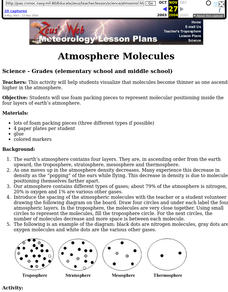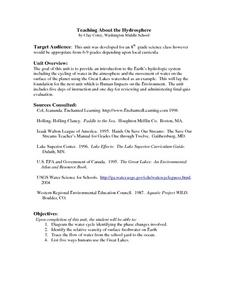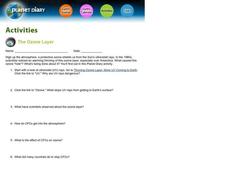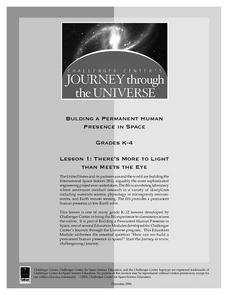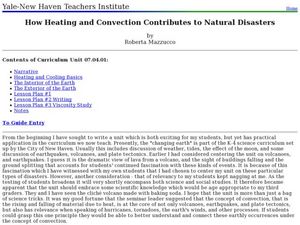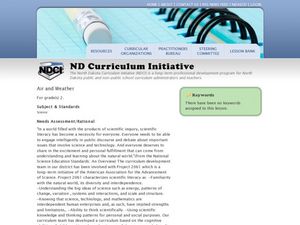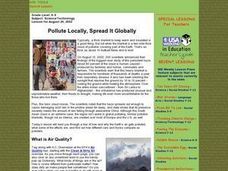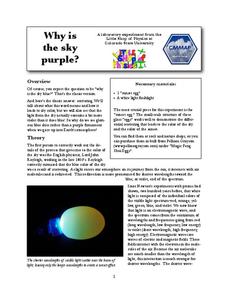Curated OER
Atmosphere Molecules
Students use foam packing pieces to represent molecular positioning inside the four layers of earth's atmosphere. This lesson help students visualize that molecules become thinner as one ascends higher in the atmosphere.
Curated OER
Science Word Search
In this science worksheet, students locate and identify various vocabulary terms related to earth science. There are 44 words/phrases located in the puzzle.
Curated OER
(S-1) Sunlight and the Earth
Learners discuss the solar heating of the Earth and atmosphere, its heat loss proceses, and the way these relate to weather and climate.
Curated OER
Weather
Students explore the earth's atmosphere, weather, and climate. They begin class with a discussion about weather patterns, atmosphere, and the layers of the earth. After the class discussion, students rotate through four stations to...
Curated OER
Bellwork for Week 15-Climate
In this bellwork worksheet, students answer questions about the layers of the atmosphere, the composition of the atmosphere and the weather and the climate.
Curated OER
Winter Season
Students recognize the relationship between Earth's tilt and the Winter season. In this Winter lesson, students work in pairs to complete make frost and design snow goggles. Students experiment a hand lens to study the frost created....
Curated OER
The Tropopause
In this tropopause worksheet, students read about the temperature of the air in the tropopause or the layer of the atmosphere closest to the Earth. They answer four critical thinking questions about this layer and the energy changes that...
Curated OER
Teaching About the Hydrosphere
Eighth graders are introduced to the Earth's hydrologic system including the cycling of water in the atmosphere and the movement of water on the surface of the planet using the Great Lakes watershed as an example.
Curated OER
The Ozone Layer
In this ozone activity students complete an interactive activity on the thinning of the ozone then answer a series of questions on the earths UV rays.
Curated OER
There's More to Light than Meets the Eye
Students explore the concept that not all light is visible to the
human eye. Although UV light is not visible, it can still be harmful, causing sunburns or skin cancer. They use special beads to detect UV light around the school....
Curated OER
Classroom Meteorologists: An Experiential Approach to Learning about Seasons and Weather
Students examine several concepts about weather in the seven lessons of this unit. This year long activity helps students to gather data seasonally about wind, clouds, precipitation, and temperature. Earth's three climate zones are...
Curated OER
How Heating and Convection Contributes to Natural Disasters
Learners study the basics of heating and cooling and how it pertains to the earth. In this global instructional activity students read the Magic Tree House book then create a chart of their findings.
Curated OER
Greenhouse Gases: The Chemistry Behind the Culprits
Ninth graders investigate the effect of different gases in the atmosphere. In this chemistry lesson, 9th graders explain how these gases contribute to global warming. They suggest possible solutions to this growing problem.
Curated OER
Air and Weather
Second graders study Earth's materials. In this air and weather instructional activity, 2nd graders note changes in the weather and examine tools that help us study the weather. Students analyze how changes in the environment make...
Curated OER
Pollute Locally, Spread It Globally
Students examine the rate of pollution throughout the world through an interactive program. They define air quality and the air quality index. They examine fuel economy and its impact on the Earth and renewable and nonrenewable resources.
Curated OER
Global Warming Information at the Mount
In this online interactive science worksheet, students answer 4 science questions with multiple choice answers regarding global warming. Students fill in the answer online to one question about temperature.
Colorado State University
What Is a "Model"?
Model the transfer of energy during a typical 24-hour period. Young scholars use a game-like approach to learning the patterns of heat transfer through the day and night. Groups of four exchange different tokens as the energy...
Curated OER
It's Raining, It's Pouring: The Water Cycle
Students investigate the relationship of the steps in the water cycle, and create a simulation of the water cycle in a jar.
Curated OER
Greenhouse Gases
Although the worksheet for the lab activity is not included, this is an activating activity for your class to do when learning about the greenhouse effect. They lay three thermometers underneath a lamp: one out in the open, one under a...
Colorado State University
Why Is the Sky Purple?
The color of the sky depends on the time of day. Young scholars experiment with scattering different wavelengths of light to recreate the color of the sky. They observe both the longer blue wavelengths and the shorter red and orange...
CK-12 Foundation
Newton's Cannon
Gravity does more than keep our feet on the ground — it holds a satellite in orbit, too. Help learners understand the effects of gravity on an orbiting object through a simulation activity. Individuals adjust a launch speed and watch as...
Curated OER
Natural Disaster
Describe how plate tectonics account for various land formations. Learners discuss different marine sanctuaries and create a poster about tectonic activity in these areas. They share their posters with the class.
Curated OER
Earth's Winds, Crust, and Atmosphere
This site provides a variety of activities and worksheets about the problem-based learning activity about Earth and its atmosphere. The lessons can be used separately or together in a geology unit. The resources and charts are very...
Curated OER
Carbon Monoxide and Population Density
Tenth graders investigate the carbon monoxide level at a fixed latitude to determine if there is a relationship to population density. They download data sets and generate a graph, and find locations using the Earth's coordinate system....


